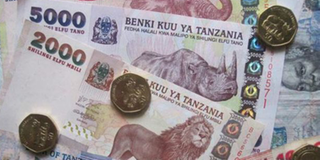Shilling rebounds after intervention

What you need to know:
Market reports indicated that the shilling remained steady at Sh2,245/2,255 against the dollar during the close of last week. However, the Bank of Tanzania (BoT) quoted the greenback at selling and buying rates of Sh2,225/2,247 last Friday from Sh2,222/2,244 recorded earlier the week.
Dar es Salaam. The shilling rebounded on Friday after depreciating slightly against the dollar for three consecutive days earlier in the week.
Market reports indicated that the shilling remained steady at Sh2,245/2,255 against the dollar during the close of last week. However, the Bank of Tanzania (BoT) quoted the greenback at selling and buying rates of Sh2,225/2,247 last Friday from Sh2,222/2,244 recorded earlier the week.
The interbank foreign exchange summaries show that a total of Sh34.18 billion was traded last week, up from Sh21.70 billion which was traded during the previous week. “The interbank market looks to stabilise around these levels after the Central Bank’s action to sell some dollars to control the recent shilling depreciation,” a KCB Tanzania treasury newsflash for Friday last week said.
Dealers say the slight depreciation of the local currency last week was a result of increased demand for the dollar and low dollar inflows from donors and exports.
However, an official with the BoT Domestic Market Department told The Citizen last week that the local currency’s downward trend was temporary.
“This change happened for just two days, so it cannot give a real picture of what is going on in the market. It could also have been a result of speculation,” said the central bank official.
“It is just temporary demand for the dollar and the movement of the currency for such a short period of time is nothing to shout about.”
However, he said higher depreciation was being experienced among bureaus de change because they were quoting the shilling at much lower levels than other currencies in the market.
The shilling gained ground against the dollar last month and during the first half of January due to increased dollar inflows from cashew nut exports. However, the sale of cashew nuts was suspended in the last fortnight.




